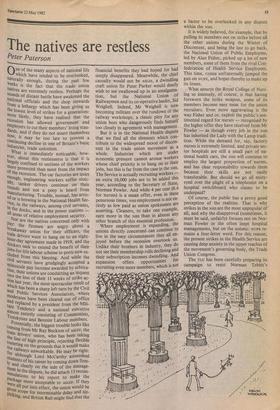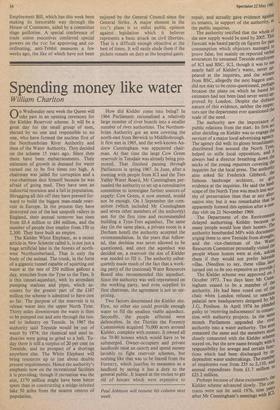The natives are restless
Peter Paterson
One of the many aspects of national life which have tended to be overlooked, naturally enough, during the past few weeks is the fact that the trade union natives are extremely restless. Perhaps the sounds of distant battle have awakened the national officials and the shop stewards from a lethargy which has been giving us the lowest level of strikes for a generation: More likely, they have realised that the recession has allowed government and employers to cut their members' living stan- dards, and if they do not assert themselves now, it may be too late to prevent a Continuing decline in one of Britain's basic industries, trade unionism. What is immediately noticeable, how- ever, ever, about this restlessness is that it is largely confined to sections of the workers More protected than most from the impact of the recession. The car factories are quiet enough, engineering workers suffer stoic- 411Y, tanker drivers continue on their rounds and not a peep is heard from manufacturing. Trouble, instead, has arriv- ed or is brewing in the National Health Ser- vice, in the railways, among civil servants, In the docks, and in the power stations
all areas of relative employment security.
Nor are the natives concerned only with pay: the firemen are angry about a breakaway union for their officers, the train drivers want to hang on to an eight-
hour-A -aY agreement made in 1919, and the
dockers seek to extend the benefit of their Jobs-for-life labour scheme to ports now ex- cluded from this blessing. And while the civil servants have grudgingly accepted a ,minuscule pay increase awarded by arbitra- tion, their unions are conducting an inquest into the loss of their 11 weeks of strike ac- tion last year, the most spectacular result of which has been a sharp left turn by the Civil and Public Services Association, where Moderates have been cleared out of office and replaced by a president from the Mili- tant Tendency and a national executive _almost entirely consisting of Communists, frotskyites and Bennite Labour members. Potentially, the biggest trouble looks like coating from Mr Ray Buckton of ASLEF, the 'rain drivers' union, who has been taking the line of high principle, rejecting flexible rostering on the grounds that it would make the railways unworkable. He may be right: for although Lord McCarthy astonished students
of his career by coming down firm-
IY and clearly on the side of the manage- ment in the dispute, he did attach 13 recom- mendations to his report to make the "ere more acceptable to ASLEF. If they wre all put into effect, the union would b. e n scope for interminable delay and rut- Pickling, and British Rail might find that the financial benefits they had hoped for had simply disappeared. Meanwhile, the chief casualty would not be ASLEF, a dwindling craft union Sir Peter Parker would dearly wish to see swallowed up in an amalgama- tion, but the National Union of Railwaymen and its co-operative leader, Sid Weighell. Indeed, Mr Weighell is now becoming militant over the rundown of the railway workshops, a classic ploy for any union boss who dangerously finds himself too closely in agreement with management. But it is in the National Health dispute that we find all the elements which con- tribute to the widespread mood of discon- tent in the trade union movement as a whole. Industries which are under economic pressure cannot arouse workers whose chief priority is to hang on to their jobs, but this is far from the case in the Nils. The Service is actually recruiting workers an extra 10,000 jobs are to be added this year, according to the Secretary of State, Norman Fowler. And while 4 per cent (6.4 for nurses) is a mean offer, even in these penurious times, NHS employment is not en- tirely as low paid as union spokesmen are asserting. Cleaners, to take one example, earn more in the NHS than in almost any other branch of this essential profession. Where employment is expanding, the unions directly concerned, can continue to live in the easy circumstances they all en- joyed before the recession overtook us. Unlike their brothers in industry, they do not see their membership rolls declining and their subscription incomes dwindling. And expansion offers opportunities for recruiting even more members, which is not
a factor to be overlooked in any dispute within the Nils.
It is widely believed, for example, that by pulling its members out on strike before all the other unions during the Winter of Discontent, and being the last to go back, the National Union of Public Employees, led by Alan Fisher, picked up a lot of new members, some of them from the rival Con- federation of Health Service Employees. This time, COHSE unfraternally jumped the gun on NUPE, and hopes thereby to make up its losses.
What annoys the Royal College of Nurs- ing so intensely, of course, is that having forsworn the strike weapon, some of its members become easy meat for the union recruiters. Even more aggravating is the way Fisher and co. exploit the public's sen- timental regard for nurses — recognised by the higher offer they have received from Mr Fowler — as though every job in the Nuts has inherited the Lady with the Lamp tradi- tion. While the demand for, say, factory nurses is extremely limited, and private sec- tor hospitals are still a small part of na- tional health care, the NHS will continue to employ the largest proportion of nurses, and has clear responsibility towards them because their skills are not easily transferable. But should we go all misty- eyed over the plight of a telephonist on a hospital switchboard who claims to be underpaid?
Of course, the public has a pretty good perception of the realities. That is why strikes in the Nuts are the most unpopular of all, and why the disapproval (sometimes, it must be said, unfairly) focuses not on Nor- man Fowler or the often inept hospital managements, but on the unions: NUPE re- mains a four-letter word. For this reason, the present strikes in the Health Service are causing deep anxiety in the upper reaches of the movement's governing body, the Trade Union Congress.
The TUC has been carefully preparing its campaign to resist Norman Tebbit's Employment Bill, which has this week been making its inexorable way through the House of Commons, aided by a committee stage guillotine. A special conference of trade union executives conferred special powers on the TUC for approving and co- ordinating, anti-Tebbit measures a few weeks ago, the like of which have not been enjoyed by the General Council since the General Strike. A major element in the TUC'S plans is to enlist public opinion against legislation which it believes represents a basic attack on civil liberties. That is a difficult enough objective at the best of times. It will easily elude them if the pickets remain on duty at the hospital gates.







































 Previous page
Previous page